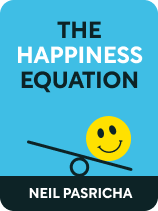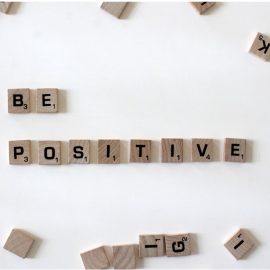

This article is an excerpt from the Shortform book guide to "The Happiness Equation" by Neil Pasricha. Shortform has the world's best summaries and analyses of books you should be reading.
Like this article? Sign up for a free trial here .
What is Neil Pasricha’s The Happiness Equation about? What are the four obstacles to happiness?
In The Happiness Equation, Neil Pasricha discusses four common obstacles that prevent us from finding happiness: 1) relying on external circumstances to make you happy, 2) seeking approval from others, 3) working for the weekend, and 4) wasting mental energy. He claims that though these obstacles are pervasive, they’re surmountable: You can train yourself to feel happier.
Let’s take a look at each of these four obstacles and Pasricha’s actionable solutions for overcoming them.
The Happiness Equation
Happiness has many benefits—it positively impacts your attitude, your chances of success, and the circumstances that play out in your life. Despite knowing this, many people find it difficult to feel consistently happy. In The Happiness Equation, Neil Pasricha claims you can overcome this difficulty by training yourself to feel happier. He explores common obstacles to happiness and provides solutions that help boost your enthusiasm for life.
In this guide, we’ll discuss Pasricha’s key advice for becoming happier, four common obstacles to happiness, and his solutions to overcome them. Additionally, we’ll supplement his ideas with psychological research and actionable methods from other self-improvement authors and practitioners.
#1: Relying on External Circumstances to Make You Happy
Basing happiness on circumstances being a certain way prevents you from feeling happy. Life’s full of problems and challenges—circumstances are rarely exactly how you want them to be, no matter how hard you try to force them into place. Therefore, there’s always an excuse not to be happy.
Though unwanted circumstances appear to justify your unhappiness, Pasricha argues that happiness isn’t linked to circumstances themselves—rather, it’s linked to how you think about them. More specifically, unwanted experiences aren’t to blame for your unhappiness—your negative thoughts about these experiences are.
This suggests a simple solution: Think about your circumstances positively. However, though you may know you’ll feel better about unwanted experiences if you think positively, you’re more likely to think negative thoughts and make yourself feel worse. According to Pasricha, this inclination to think negatively is due to evolution: To ensure survival, your ancestors had to constantly stay alert to danger and think about food and shelter. Letting their guard down and enjoying themselves made them vulnerable to predators and competitors.
Hundreds of years on, you’re living a lot more comfortably, but your instinct to avoid danger hasn’t evolved. However, instead of protecting you from threats to your survival, this instinct now encourages you to focus on “threats” such as what you don’t have and what needs to improve. This negative focus convinces you that you have endless reasons to feel unhappy.
Solution: Train Yourself to Think Positive Thoughts
Because your happiness depends on how you think about circumstances, Pasricha suggests that the first key to feeling happier is training yourself to think more positively and feel happy regardless of your circumstances. He suggests training yourself with six methods.
Method #1: Get Active
30 minutes of exercise three times a week increases your ability to feel positive and reduces symptoms of stress, anxiety, and depression.
Method #2: Do Good Deeds
Deliberately performing spontaneous acts of kindness makes you feel good about yourself. An added benefit is that others show more appreciation to you too.
Method #3: Switch Off
Taking time off from your to-do lists and distractions allows your brain to rest and recharge—giving you more energy to maintain a positive focus.
Method #4: Engage Fully
Being fully engaged in your tasks and activities deters distractions because your brain is occupied by accessing all of your knowledge and skills. This makes you feel more positive and also increases your productivity.
Method #5: Practice Meditation
Adopting a daily mindfulness ritual such as meditation builds your self-awareness, encourages feelings of compassion towards yourself and others, and decreases feelings of stress and anxiety.
Method #6: Be Thankful
Each day, make a small list of things to be grateful for. Taking time to write about experiences you’re thankful for keeps you focused on what you like about your life and how lucky you are.
#2: Seeking Approval From Others
Chasing external validation makes you unhappy by pushing you to act in ways that don’t support what you really want. Pasricha explains that many of “your” goals are actually an attempt to gain approval from others, and the way you judge yourself depends on how you perceive others’ reactions to you:
- When you perceive others reacting positively to you, you judge yourself positively and this makes you happy.
- When you perceive others reacting negatively to you, you judge yourself negatively and this makes you unhappy.
When your happiness is tied up with how you perceive others’ reactions to you, you feel impelled to project a pleasing or impressive image of yourself that invites positive feedback. You make decisions about how to look and behave, your career, and your possessions to support this image. However, making decisions and setting goals based on how you want others to react to you creates internal conflict for three reasons:
- Different people have different perspectives and expectations. Your behaviors and goals can’t please or impress everyone, so you won’t always receive positive feedback.
- Basing your happiness on external validation forces you to conform to what other people want instead of what you want—because pleasing yourself won’t always elicit the feedback you crave.
- Your motivation to please or impress others forces you into constant comparison and competition. You strive to be more like people who receive the validation you want and set yourself ambitious goals to outdo them.
This internal conflict erodes your confidence and elicits feelings of self-contempt. You never feel like you’re good enough to receive the validation you crave because there are always new expectations to meet or ways that others appear to be doing better than you. Overall, you spend more time chasing validation and less time feeling happy with who you are.
Solution: Accept Who You Are and Figure Out What Makes You Happy
Instead of chasing validation, focus on feeling happiness. Free yourself from the need for validation by accepting who you are and what you need to feel happy. Pasricha argues that this shift in thinking encourages a cycle of happiness: Self-acceptance inspires you to align your behaviors and decisions with what makes you happy. This alignment encourages positive self-judgment and influences you to make decisions that further increase your happiness.
Furthermore, the more you encourage positive self-judgment and engage in things that make you happy, the less time you waste thinking about how others perceive you. This helps you accept yourself exactly as you are and frees you from the pressure of adapting to please or impress others.
According to Pasricha, this increases your happiness in two ways: First, placing less weight on what others think of you decreases insecurity and self-consciousness and increases self-confidence. Second, because you’re not projecting a false image of yourself or hiding behind achievements, you feel comfortable knowing that people appreciate you for who you are, not who you’re pretending to be. This naturally improves your self-judgment, allows you to relax and enjoy being yourself, and encourages you to make decisions that continue to fuel your happiness.
Pursue Enjoyable Activities to Practice Self-Acceptance
Pasricha suggests practicing self-acceptance and figuring out what makes you happy by considering what activities you do purely for enjoyment. From there, increase your happiness by brainstorming additional ways to pursue these activities in different contexts or with different people. For example, if you enjoy writing, start a blog or join a writing group to create more opportunities to experience happiness.
#3: Working for the Weekend
Thinking of work as something you have to do erodes happiness. According to Pasricha, Western society conditions you to value work only in terms of how it financially supports what you do in your free time—weekends, vacations, and eventual retirement. This attitude promotes two problematic ideas: First, happiness only comes from having free time. Second, work earns your free time and happiness. These ideas fuel the belief that work is simply a means to an end that you must endure.
This line of thinking has a massive impact on your overall happiness—assuming you spend about a third of your life working, the belief that work is something to endure means you spend a third of your life feeling resentful and dissatisfied. What’s worse, these negative feelings drain your energy and bleed over into the free time you work so hard to earn. You either feel too tired or frustrated about work to enjoy your free time, or you spend a large part of that time dreading your return to work.
Since retirement removes the need to work for free time, it’s easy to assume that it breaks this cycle of dissatisfaction. However, Pasricha argues that retirement makes you unhappy, both during your working life and after you retire:
- During your working life, planning to retire impels you to make sacrifices for the promise of a leisurely future. You follow the “work and save” formula and seek out well-paid jobs to fund your retirement account. But, well-paid jobs often require longer hours—so you end up with little free time to enjoy your life.
- Once you hit retirement, you risk feeling bored, useless, and dissatisfied. Pasricha explains that work provides a productive way to apply skills and knowledge, opportunities to take on challenges or make a contribution, and social stimulation. Without this structure, your free time feels like a void and no longer makes you happy.
Solution: Focus on Work That Satisfies You
Think of work not as a means to an end but as a means to satisfaction. Pasricha argues that work should be as enjoyable as free time. When you choose work that aligns with your interests and passions, you feel more engaged, motivated, and productive—and therefore happy—in that third of your life.
Make work more enjoyable by choosing a job you’d happily do in your free time. Integrate your list of enjoyable activities from Solution #2 with your knowledge and skills to come up with potential ideas for satisfying work.
For your long-term strategy, Pasricha recommends substituting your goal to retire with an ongoing goal to look for challenging opportunities that keep you active and engaged. For example, you may continue to work, set learning goals, or volunteer for causes you care about.
#4: Wasting Mental Energy
Overdoing coupled with overthinking leads to mental exhaustion and dissatisfaction. It’s easy to fall into the trap of always being too busy with a neverending to-do list, both at work and at home. Though you’re constantly multi-tasking and running to catch up with all of your chores and obligations, you never feel like you’ve done enough. In the midst of all this multitasking, you’re making hundreds of unimportant decisions, such as choosing whether to start an email with “Hi” or “Hey.” According to Pasricha, all of this doing and thinking wastes a vast amount of energy and prevents you from relaxing and feeling happy.
Pasricha argues that much of what you spend your time doing or thinking about is trivial, and that trivial tasks don’t make you feel happier or help you achieve your goals. Instead, they contribute to feelings of stress and overwhelm because they waste your time, deplete your energy, and gnaw away at your focus and progress on your goals.
- For example, deliberating over how to start an email uses up time and energy, distracts you from productive tasks, and eats into your relaxation time. But the result doesn’t matter and offers no benefits.
Solution: Minimize Trivial Tasks and Decisions
Reserve your energy for things that matter to you. Pasricha claims that removing the burden of trivial tasks and decisions reduces feelings of stress and fatigue and increases physical and mental energy. This additional energy improves your ability to focus on what you want to achieve, your motivation, and your levels of productivity and creativity. As a result, you make progress on your goals and have energy to spare.
Pasricha suggests five methods to reduce the toll of trivial tasks and decisions and increase mental energy:
Method #1: Establish Routines for Regular Tasks
Pasricha suggests restricting time spent on regular tasks by automating as much as possible and creating routines and tight schedules for everything else. For example, if you currently check your blog stats multiple times a day, automate this task by opting to receive a single notification once a day. Alternatively, check your blog stats at a specific time each week instead of multiple times each day.
Method #2: Cut Unnecessary Decisions
Write down all of the decisions you make in a day and consider which ones are insignificant wastes of time and energy. According to Pasricha, a decision is “insignificant” if the outcome doesn’t increase your happiness or contribute to your goals. Then, come up with ways to remove the necessity of these decisions. For example, deciding to eat the same breakfast every day saves time and energy each morning and every time you go to the store.
Method #3: Avoid Multitasking and Limit Distractions
Your brain can only focus on one thing at a time. Switching between tasks or giving in to distractions uses up mental energy and slows down productivity. Therefore, Pasricha suggests focusing on one thing at a time and limiting potential distractions to get more done in less time. For example, switch off your phone and email alerts until you complete your task.
Method #4: Set Early Deadlines
Pasricha argues that giving yourself more time to accomplish a task only gives you more time to waste—you feel no sense of urgency, so you procrastinate. In contrast, giving yourself less time to complete something increases your motivation and encourages you to prioritize what you need to do to achieve your goal efficiently.
Method #5: Build Momentum on Tasks You’re Avoiding
There are always going to be things you have to do but don’t want to do due to a lack of confidence or motivation. Avoiding these tasks doesn’t make them go away. Rather, your procrastination incites feelings of fear or guilt because you’re constantly thinking of what you should be doing. These negative feelings then make the tasks seem more difficult than they are.
According to Pasricha, forcing yourself to start these tasks reduces their mental toll and improves your confidence and motivation. While starting a task initially requires overcoming reluctance, taking action leads to progress that affirms your ability to get the task done. Building momentum on the task feels so good that it makes you want to complete it.

———End of Preview———
Like what you just read? Read the rest of the world's best book summary and analysis of Neil Pasricha's "The Happiness Equation" at Shortform .
Here's what you'll find in our full The Happiness Equation summary :
- How to overcome the four common obstacles to happiness
- The five methods to reduce the toll of trivial tasks and decisions
- Why you need to stop chasing external validation






